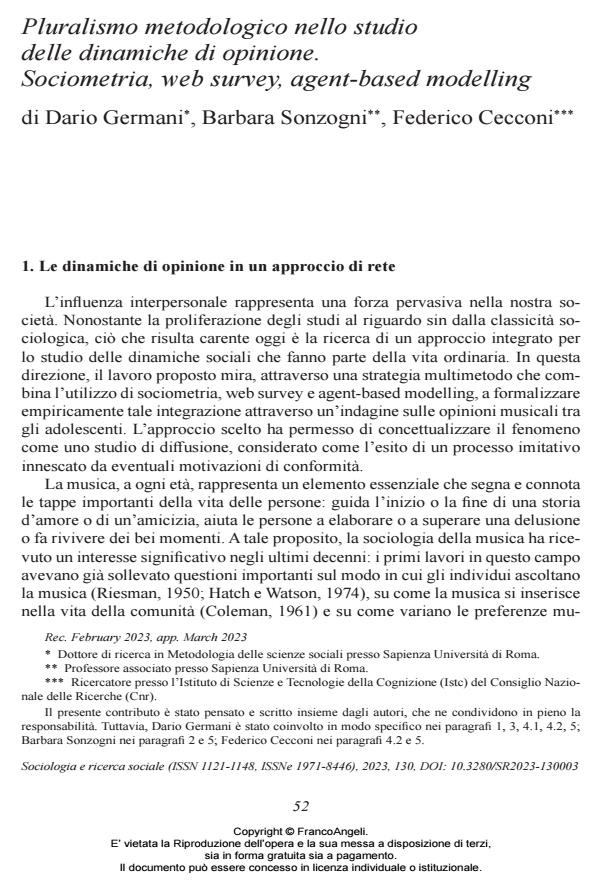Pluralismo metodologico nello studio delle dinamiche di opinione. Sociometria, web survey, agent-based modelling
Titolo Rivista SOCIOLOGIA E RICERCA SOCIALE
Autori/Curatori Dario Germani, Barbara Sonzogni, Federico Cecconi
Anno di pubblicazione 2023 Fascicolo 2023/130
Lingua Italiano Numero pagine 14 P. 52-65 Dimensione file 214 KB
DOI 10.3280/SR2023-130003
Il DOI è il codice a barre della proprietà intellettuale: per saperne di più
clicca qui
Qui sotto puoi vedere in anteprima la prima pagina di questo articolo.
Se questo articolo ti interessa, lo puoi acquistare (e scaricare in formato pdf) seguendo le facili indicazioni per acquistare il download credit. Acquista Download Credits per scaricare questo Articolo in formato PDF

FrancoAngeli è membro della Publishers International Linking Association, Inc (PILA)associazione indipendente e non profit per facilitare (attraverso i servizi tecnologici implementati da CrossRef.org) l’accesso degli studiosi ai contenuti digitali nelle pubblicazioni professionali e scientifiche
Interpersonal influence is a pervasive force in our society. However, despite the many studies in this regard, starting in particular from the sociological classicism, today, what would seem to be missing is the use of an integrat- ed approach to the study of the dynamics of interaction that involve us every day. This study arises from the need to empirically formalize this phenomenon through an investigation of musical preferences among adolescents, thus posing further questions about the ways and reasons why individuals enter into rela- tionships with others. The integrated approach between sociometry, web survey and agent-based modelling allows the phenomenon’s conceptualization as a diffusion study, i.e., the outcome of an imitative process triggered by any reasons for compliance. In particular, the concepts of social influence and homophily have been traced back to a dual mechanism that explains the phenomenon: 1) the behavior of peers who occupy a relevant position within relational groups; and 2) the interaction favored by specific elements related to the similarity be- tween individuals. The empirical results obtained from a web survey were com- pared with those generated by the simulative model in order to reproduce the observed social phenomenon and to control the theoretical hypotheses underly- ing the model itself.
Dario Germani, Barbara Sonzogni, Federico Cecconi, Pluralismo metodologico nello studio delle dinamiche di opinione. Sociometria, web survey, agent-based modelling in "SOCIOLOGIA E RICERCA SOCIALE " 130/2023, pp 52-65, DOI: 10.3280/SR2023-130003